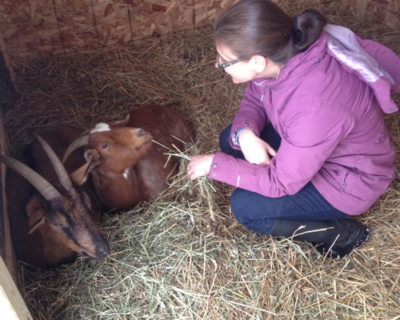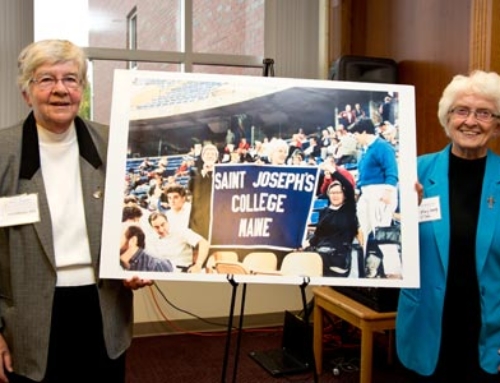 When Carmina Chapp isn’t grading papers, she’s milking goats, collecting eggs, and planting seeds. Chapp, assistant director of online theology programs at Saint Joseph’s College, and her husband, Larry, own and operate the Dorothy Day Catholic Worker Farmin northeastern Pennsylvania. But Chapp’s endeavors in farming are for more than the milk, eggs, and vegetables—they are a way for her to live what she teaches.
When Carmina Chapp isn’t grading papers, she’s milking goats, collecting eggs, and planting seeds. Chapp, assistant director of online theology programs at Saint Joseph’s College, and her husband, Larry, own and operate the Dorothy Day Catholic Worker Farmin northeastern Pennsylvania. But Chapp’s endeavors in farming are for more than the milk, eggs, and vegetables—they are a way for her to live what she teaches.
What inspired you to create the Dorothy Day Catholic Worker Farm?
Starting the farm was truly a product of prayer and discernment. I was introduced to the life and work of Dorothy Day and Peter Maurin, founders of the Catholic Worker Movement, when I was in college. I was just coming alive in my own Catholic faith, and was taken with how radically they were trying to live the Gospel message of Jesus. They had started programs in cities to provide shelter and food to the homeless and hungry, and they ran farms that offered a retreat for people to experience and appreciate nature.
The Dorothy Day Catholic Worker Farm was established in 2013 as a self-sustaining, organic farm to provide produce for those in need, and a place of hospitality for those needing a quiet place of respite. We follow a Benedictine spirituality. Daily life on the farm is a rhythm of prayer and work that respects the dignity of the human person and God's creation.
What do you produce at the farm?
We have a three-acre field where we grow lots of tomatoes and squash, and also some peppers, potatoes, beans, lettuce, cucumbers, pumpkins, and corn. Our next phase is to experiment with permaculture methods to yield the most from our little field. We also have free-range chickens, which provide us with lots of eggs, several goats for milk, and sheep and alpacas for wool. The majority of the harvest is sent to soup kitchens and food pantries. Eventually, we will make hats and gloves out of the fleece.
How much time do you spend working on the farm each day?
The work of the farm is constant, so we are careful to maintain a healthy balance of work, rest, and prayer. There are chores that must be done every day, seasonal work, and ongoing projects. And there are always visitors and volunteers. It is a full-time responsibility.
How does your work on the farm relate to your work at Saint Joseph’s?
As a College rooted in and professing fidelity to the teachings of Jesus Christ and the doctrines and heritage of the Roman Catholic Church, SJC is committed to enhancing students' awareness of human dignity and the meaning of life. The College advocates for justice and peace in recognition of each person's responsibility for the welfare of both humankind and the environment. These concepts are consistent with the philosophy of the Dorothy Day Catholic Worker Farm. We believe the farm has been given to us by God to care for as he would. We grow our food organically and strive to welcome every visitor as we would Christ.
How does this work compare to your work in academia?
Farm life is a wonderful complement to my academic work. As a theologian, I have been studying and teaching Catholic theology for over twenty years. On the farm, I feel like I am living what I have been teaching. All the agrarian metaphors that we find in the Bible really come to life on the farm—perhaps this is why Peter Maurin was such a strong advocate for a return to the land. This is especially true when you use organic methods. You have to nourish and nurture the soil. The parallels between the natural/physical life and supernatural/spiritual life become so evident. It is also very humbling to experience such an utter dependence on God—you literally plant a seed and pray for rain!


